Audi Q4 e-tron vs BMW iX - Differences and prices compared
Costs and Efficiency:
When it comes to price and running costs, the biggest differences usually appear. This is often where you see which car fits your budget better in the long run.
Audi Q4 e-tron has a clearly advantage in terms of price – it starts at 39600 £, while the BMW iX costs 71600 £. That’s a price difference of around 32014 £.
In terms of energy consumption, the advantage goes to the Audi Q4 e-tron: with 15.90 kWh per 100 km, it’s somewhat more efficient than the BMW iX with 17.80 kWh. That’s a difference of about 1.90 kWh.
As for range, the BMW iX performs distinct better – achieving up to 701 km, about 147 km more than the Audi Q4 e-tron.
Engine and Performance:
Power, torque and acceleration say a lot about how a car feels on the road. This is where you see which model delivers more driving dynamics.
When it comes to engine power, the BMW iX has a significantly edge – offering 659 HP compared to 340 HP. That’s roughly 319 HP more horsepower.
In acceleration from 0 to 100 km/h, the BMW iX is decisively quicker – completing the sprint in 3.80 s, while the Audi Q4 e-tron takes 5.40 s. That’s about 1.60 s faster.
In terms of top speed, the BMW iX performs noticeable better – reaching 250 km/h, while the Audi Q4 e-tron tops out at 180 km/h. The difference is around 70 km/h.
There’s also a difference in torque: BMW iX pulls noticeable stronger with 1015 Nm compared to 679 Nm. That’s about 336 Nm difference.
Space and Everyday Use:
Cabin size, boot volume and payload all play a role in everyday practicality. Here, comfort and flexibility make the difference.
Seats: offers more seating capacity – vs .
In curb weight, Audi Q4 e-tron is noticeable lighter – 2035 kg compared to 2525 kg. The difference is around 490 kg.
In terms of boot space, the Audi Q4 e-tron offers hardly perceptible more room – 535 L compared to 500 L. That’s a difference of about 35 L.
In maximum load capacity, the BMW iX performs a bit better – up to 1750 L, which is about 260 L more than the Audi Q4 e-tron.
When it comes to payload, BMW iX to a small extent takes the win – 575 kg compared to 515 kg. That’s a difference of about 60 kg.
Who comes out on top?
Overall, the BMW iX shows itself to be dominates this comparison and secures the title of DriveDuel Champion.
It convinces with the more balanced overall package and proves to be the more versatile choice for everyday use.
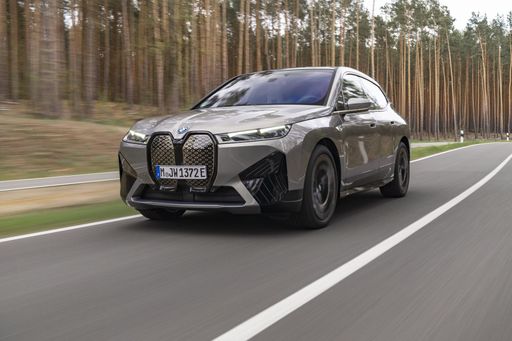 @ BMW Group Press
@ BMW Group Press
BMW iX
Costs and Consumption
View detailed analysis
Engine and Performance
View detailed analysis
Dimensions and Body
View detailed analysis
Audi Q4 e-tron
The Audi Q4 e-tron brings Audi polish into the electric crossover scene, pairing a sleek exterior with a refined, airy interior that makes everyday driving feel distinctly premium. It’s an easy-to-live-with EV that balances comfort and real-world usability with intuitive tech, making it a smart choice for buyers who want electric mobility without giving up Audi character — and yes, it still looks good in the driveway.
details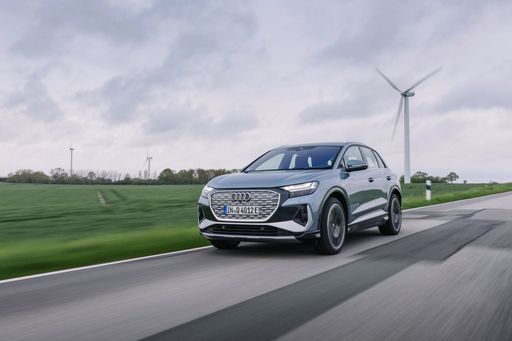 @ Audi AG
@ Audi AG
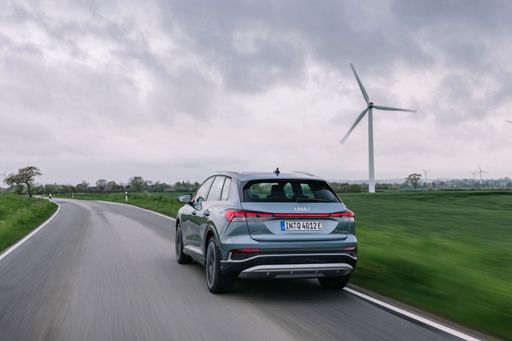 @ Audi AG
@ Audi AG
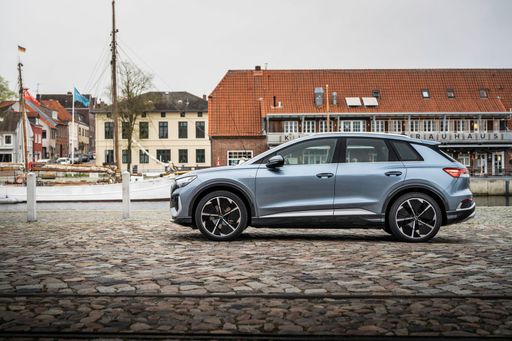 @ Audi AG
@ Audi AG
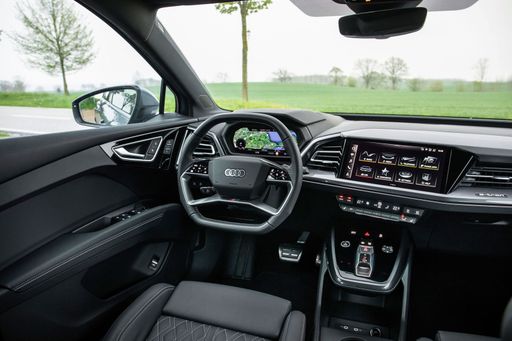 @ Audi AG
@ Audi AG
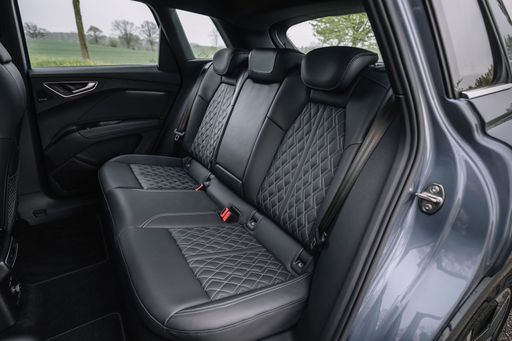 @ Audi AG
@ Audi AG
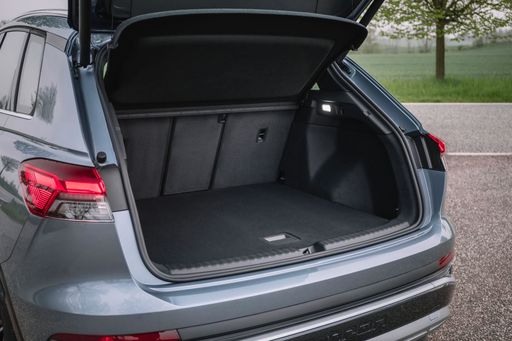 @ Audi AG
@ Audi AG
BMW iX
The BMW iX arrives like a tech-rich luxury SUV that refuses to shout, offering a serene yet authoritative road presence that suits both city commutes and long-distance cruising. Inside, its minimalist cabin wraps high-quality materials and clever interfaces around a driver-focused layout, making it feel more like a forward-thinking lounge than just another electric appliance — and yes, it still delivers the dynamic driving character you'd expect from a BMW.
details @ BMW Group Press
@ BMW Group Press
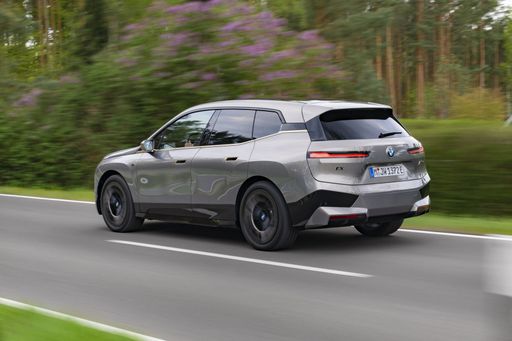 @ BMW Group Press
@ BMW Group Press
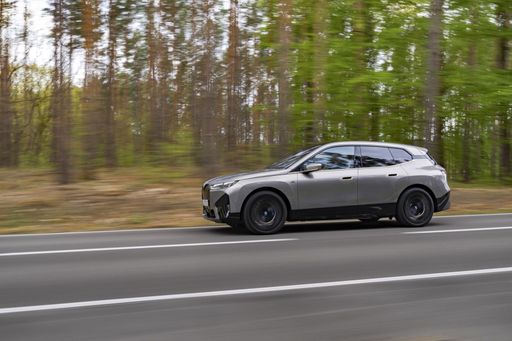 @ BMW Group Press
@ BMW Group Press
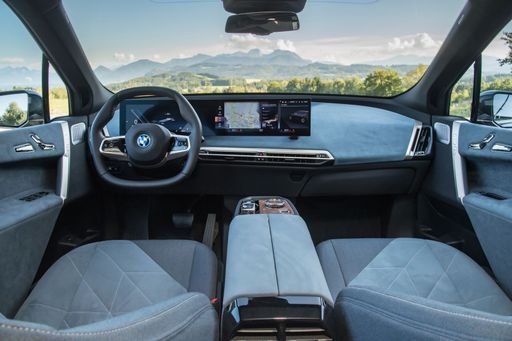 @ BMW Group Press
@ BMW Group Press
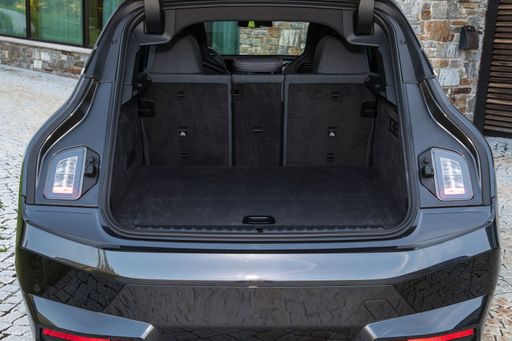 @ BMW Group Press
@ BMW Group Press
 @ Audi AG
@ Audi AG
|
 @ BMW Group Press
@ BMW Group Press
|
|
|
|
Costs and Consumption |
|
|---|---|
|
Price
39600 - 58800 £
|
Price
71600 - 107100 £
|
|
Consumption L/100km
-
|
Consumption L/100km
-
|
|
Consumption kWh/100km
15.9 - 17.4 kWh
|
Consumption kWh/100km
17.8 - 20.6 kWh
|
|
Electric Range
406 - 554 km
|
Electric Range
600 - 701 km
|
|
Battery Capacity
59 - 77 kWh
|
Battery Capacity
96 - 109.6 kWh
|
|
co2
0 g/km
|
co2
0 g/km
|
|
Fuel tank capacity
-
|
Fuel tank capacity
-
|
Dimensions and Body |
|
|---|---|
|
Body Type
SUV
|
Body Type
SUV
|
|
Seats
5
|
Seats
5
|
|
Doors
5
|
Doors
5
|
|
Curb weight
2035 - 2235 kg
|
Curb weight
2525 - 2655 kg
|
|
Trunk capacity
520 - 535 L
|
Trunk capacity
500 L
|
|
Length
4588 mm
|
Length
4965 mm
|
|
Width
1865 mm
|
Width
1970 mm
|
|
Height
1614 - 1632 mm
|
Height
1688 - 1695 mm
|
|
Max trunk capacity
1460 - 1490 L
|
Max trunk capacity
1750 L
|
|
Payload
505 - 515 kg
|
Payload
505 - 575 kg
|
Engine and Performance |
|
|---|---|
|
Engine Type
Electric
|
Engine Type
Electric
|
|
Transmission
Automatic
|
Transmission
Automatic
|
|
Transmission Detail
Reduction Gearbox
|
Transmission Detail
Reduction Gearbox
|
|
Drive Type
Rear-Wheel Drive, All-Wheel Drive
|
Drive Type
All-Wheel Drive
|
|
Power HP
204 - 340 HP
|
Power HP
408 - 659 HP
|
|
Acceleration 0-100km/h
5.4 - 8.1 s
|
Acceleration 0-100km/h
3.8 - 5.1 s
|
|
Max Speed
160 - 180 km/h
|
Max Speed
200 - 250 km/h
|
|
Torque
310 - 679 Nm
|
Torque
700 - 1015 Nm
|
|
Number of Cylinders
-
|
Number of Cylinders
-
|
|
Power kW
150 - 250 kW
|
Power kW
300 - 485 kW
|
|
Engine capacity
-
|
Engine capacity
-
|
General |
|
|---|---|
|
Model Year
2023 - 2025
|
Model Year
2025
|
|
CO2 Efficiency Class
A
|
CO2 Efficiency Class
A
|
|
Brand
Audi
|
Brand
BMW
|
What drive types are available for the Audi Q4 e-tron?
The Audi Q4 e-tron is offered with Rear-Wheel Drive or All-Wheel Drive.
The prices and data displayed are estimates based on German list prices and may vary by country. This information is not legally binding.
